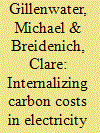| Srl | Item |
| 1 |
ID:
088054


|
|
|
|
|
| Publication |
2009.
|
| Summary/Abstract |
Several western states have considered developing a regulatory approach to reduce greenhouse gas (GHG) emissions from the electric power industry, referred to as a load-based (LB) cap-and-trade scheme. A LB approach differs from the traditional source-based (SB) cap-and-trade approach in that the emission reduction obligation is placed upon Load Serving Entities (LSEs), rather than electric generators. The LB approach can potentially reduce the problem of emissions leakage, relative to a SB system. For any of these proposed LB schemes to be effective, they must be compatible with modern, and increasingly competitive, wholesale electricity markets. LSE's are unlikely to know the emissions associated with their power purchases. Therefore, a key challenge for a LB scheme is how to assign emissions to each LSE. This paper discusses the problems with one model for assigning emissions under a LB scheme and proposes an alternative, using unbundled Generation Emission Attribute Certificates. By providing a mechanism to internalize an emissions price signal at the generator dispatch level, the tradable certificate model addresses both these problems and provides incentives identical to a SB scheme.
|
|
|
|
|
|
|
|
|
|
|
|
|
|
|
|
| 2 |
ID:
126610


|
|
|
|
|
| Publication |
2013.
|
| Summary/Abstract |
This paper presents results from a model of a representative wind power investor's decision making process using a Monte Carlo simulation of a project financial analysis. Data, in the form of probability distribution functions (PDFs) for key input variables were collected from interviews with investors and other professionals active in the U.S. wind power industry using a formal expert elicitation protocol. This study presents the first quantitative estimates of the effect of the U.S. voluntary Renewable Energy Certificate (REC) market on renewable energy generation. The results indicate that the investment decisions of wind power project developers in the United States are unlikely to have been altered by the voluntary REC market. The problem with the current voluntary REC market is that it does not offer developers a reliable risk-adjusted revenue stream. Consequently, the claims by U.S. green power retailers and promoters that voluntary market RECs result in additional wind power projects lack credibility. Even dramatic increases in voluntary market REC prices, in the absence of long-term contracts, were found to have only a small effect on investor behavior.
|
|
|
|
|
|
|
|
|
|
|
|
|
|
|
|